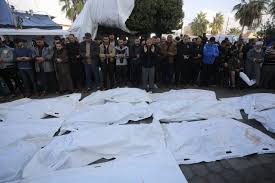KACAMATA NETIZEN – In a dramatic escalation of regional tensions, Israel faced a barrage of over 100 rockets launched by Hezbollah from southern Lebanon, marking one of the most intense cross-border attacks in recent years. The assault has left both sides on high alert, with fears of a broader conflict looming.
The rockets, reportedly targeting northern Israeli towns, prompted air raid sirens and widespread evacuations. The Israeli Defense Forces (IDF) responded with artillery and airstrikes aimed at suspected Hezbollah positions. Initial reports indicate significant damage in several areas, though casualties remain unconfirmed.
This attack follows weeks of rising hostilities in the region, with Hezbollah citing “provocations” by Israeli forces near disputed border areas as justification for the rocket salvo. The group’s leader, Hassan Nasrallah, warned of “greater repercussions” if their demands are not met, further exacerbating the fragile situation.
Putin’s Nuclear Move Adds to Global Anxiety
Amid these escalating tensions, Russian President Vladimir Putin announced a controversial amendment to the country’s nuclear policies. The change, which allows for a “first-strike” nuclear option under perceived existential threats, has sparked alarm among international observers.
While Putin’s announcement did not directly reference the Middle East conflict, analysts believe it could be a signal to Western nations supporting Israel. Moscow has long maintained a complex but strategic relationship with Hezbollah and its ally, Iran, and the timing of Putin’s statement has fueled speculation about Russia’s role in the unfolding crisis.
The international community has called for restraint, with the United Nations urging all parties to return to dialogue. However, with tensions spiraling in both the Middle East and global geopolitics, the path to de-escalation remains unclear.
This dual development has heightened fears of a broader conflict that could draw in regional and global powers. For Israel, facing attacks from multiple fronts, the situation underscores the growing complexities of its security challenges. Meanwhile, Hezbollah’s actions risk igniting a full-scale war with far-reaching consequences for Lebanon, already grappling with severe economic and political instability.
As the world watches these volatile events unfold, the interplay between local hostilities and global power dynamics could define the next chapter of this enduring conflict.













Leave a Reply